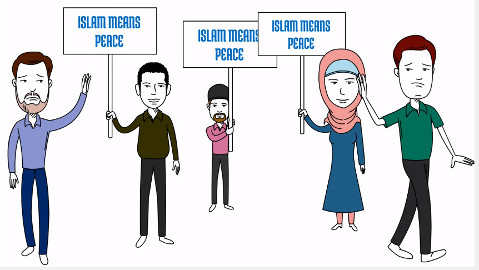‘Create Not Disorder in the Earth’
The Mercy of Allah Looks to Those Who Do Good

“Personally, I’ll admit that I was a bit surprised that the concept of ‘Mercy’ was most prevalent in the Quran.” —Tom H. C. Anderson upon completion of his analysis assessing if the Holy Quran were more violent than the Holy Bible.
As the fear of Islam continues to permeate society, non-Muslims find themselves questioning the source of Islam’s foundation, the Holy Qur’an, as a source of disorder. Since extremists allege to use the holy scripture for their nefarious behavior, the Holy Qur’an is often erroneously portrayed, negatively leading people to believe that it is perhaps a source of violence. While extremists and opponents to Islam alike choose to cherry-pick verses to create this negative perception, True Islam and the Extremists campaign hopes to educate both Muslims and non-Muslims about the inherently peaceful teachings of Islam. The True Islam campaign invites introspection for both groups to comprehend fully the mercy God is extending within the Holy Qur’an.
Since verses in any religious book can be distorted by incorrect interpretation, it is important to analyze and understand the value of such scriptures for their followers. Most holy scriptures typically discuss good and evil, and provide a guide toward the right course of action one is to live in one’s life. For those scrutinizing the Holy Qur’an, it may be noteworthy to acknowledge that almost every place where punishment is mentioned, the mercy of God is also mentioned, such as: “O My servants who have sinned against their souls, despair not of the mercy of Allah, surely, Allah forgives all sins. Verily, He is Most Forgiving, Ever-Merciful.” (39:54).
Verse after verse, the Holy Qur’an reminds people who have done wrong that God forgives people simply by them asking for forgiveness: “And those who, when they commit a foul deed or wrong themselves, remember Allah and implore forgiveness for their sins and who can forgive sins except Allah? And do not knowingly persist in what they do. It is these whose reward is forgiveness from their Lord and gardens beneath which rivers flow, wherein they shall abide, and excellent is the reward of good workers.” (3:136-137)
These verses leave one to ponder: If any punishment was indeed set in stone, then why would the door of forgiveness be open? Similar verses are found throughout the Holy Qur’an. And while some may think an exhaustive search is needed to shed light on this mercy, a simple examination of the first chapter of the Qur’an provides clarity of God’s mercy.
The opening chapter, titled Al-Fatiha, has been acknowledged by Muslim scholars to be a summary of the entire Holy Qur’an. It establishes a balance between fear and hope of God with its first two verses which praise God and establish His oneness. The third verse summarizes the characteristics of God by only using two of His numerous attributes: “The Gracious, the Merciful.” By only stating these two attributes of the 99 mentioned in the Holy Qur’an, the verse expresses that God’s blessings are immense and that He is indeed very merciful. In the fourth verse, “Master of the Day of Judgment,” God indicates that our actions throughout our lives will be judged. Immediately the reader can reflect that God mentions His mercy before He draws attention to the Day of Judgment. By placing mercy and graciousness before judgment, the reader is safe to surmise that mankind will always be forgiven by God since His mercifulness is in abundance.
God, in the Qur’an, does establish His authority by asking His believers to fear Him. This pattern has been witnessed in the Old and New Testament as well. But in the Holy Qur’an, God tells His believers that fear should be in the form of fear of the loss of His favors, the loss of His love, the loss of His help, and so forth. It is for this fear that His believers are to pray for closeness to Him and for forgiveness: “And create not disorder in the earth after it has been set in order, and call upon Him in fear and hope. Surely, the mercy of Allah is nigh unto those who do good.” (7:57)
The actions of extremists cannot justify the claim that the Qur’an is a book of violence or that God encourages Muslims to be violent. In essence, it is a book of mercy for its followers. This holy scripture is filled with guidelines for believers to follow, and if one falters, he or she still has a chance at mercy before punishment. Those who choose to distort the verses of the Holy Qur’an for their diabolical agenda can be stopped with campaigns such as the True Islam and the Extremist effort. It is the goal of the campaign to deter anyone from believing that the Holy Qur’an sanctions any form of violence toward humanity. Should anyone wish to learn more, please visit the TrueIslam.com website to request a free copy of the Holy Qur’an.



